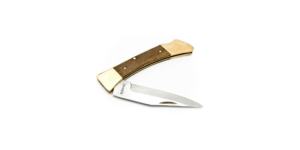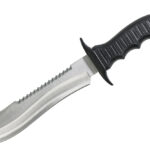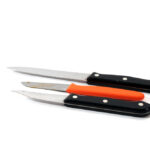The New Offences and Penalties that Apply to Possessing a Knife in a Public Place in NSW

Former NSW attorney general Mark Speakman charged the NSW Sentencing Council in 2022, with inquiring into the sentencing provisions regarding offences dealing with firearms, knives and other weapons. And the focus was to be on the carrying of weapons and whether reforms were needed.
Now NSW opposition leader, Speakman said in late 2022, “I want to make sure that sentencing laws relating to possession and use of firearms, knives and other weapons remain in line with community expectations and that law enforcement agencies have access to the tools they need”.
Current NSW AG Michael Daley tabled the Criminal Legislation Amendment (Knife Crimes) Bill 2023 on 20 June. It sought to increase penalties for possession of knives in public. And despite the council not having reported as yet, the Minns government passed the new laws just nine days later.
At the time the bill was tabled, four main knife crimes appeared in the Summary Offences Act 1988 (NSW). Two of these, the offence of having custody of a knife in public and wielding a knife in public, were then moved into the Crimes Act 1900 (NSW), and their penalties were increased.
But victims’ groups and families speaking in the press on the day the bill was tabled stated that while they welcomed the reforms in the face of “multiple fatal stabbings in NSW” over recent years, they asserted that government ought to focus on restorative justice and preventative measures.
Summary to indictable
The knife crime reforms were brought forward, despite the ongoing Sentencing Council inquiry, following Operation Foil, a two-day program held by NSW police last May, which targeted knife crimes and resulted in the seizure of 294 knives and saw 172 people charged with 565 offences.
Daley told the NSW lower house in June that the crimes contained in sections 11C and 11E of the Summary Offences Act were to be revoked and almost the exact same offences were to be inserted into the Crimes Act, with the main difference involved being an increase to the penalties applying.
The main difference between offences considered to be summary crimes in the Act of the same name and the indictable offences contained in the Crimes Act is that summary offences are less serious crimes and, therefore, carry less severe penalties.
Summary offences usually don’t carry a maximum of more than 2 years imprisonment. And certain indictable offences, known as table matters, which are listed in schedule 1 of the Criminal Procedure Act 1986 (NSW), can be tried summarily in the Local Court if the decision is made to do so.
So, the increase in the penalties for custody of or wielding a knife in public and the placing of these two offences in the Crimes Act does signify that from that point on these crimes are to be considered more serious in nature.
Custody of a knife in public
The reforms have seen the crime of having custody of knives in public places or schools inserted into new section 93IB of the Crimes Act. The maximum penalties for this crime have increased from a $2,200 fine to one of $4,400, and the 2 years prison that had applied has been upped to 4 years.
The section further provides that the defence of reasonable excuse can be raised against the charge, and it provides a list of circumstances in which a knife can be possessed. These include for “the lawful pursuit of… occupation, education or training or for the consumption or preparation of food.
Other reasonable excuses can involve “participation in a lawful entertainment, recreation or sport, or the exhibition of knives for retail or other trade purposes or an organised exhibition by knife collectors or the wearing of an official uniform or genuine religious purposes.
Travelling to and from any of the above-mentioned circumstances that warrant the custody of a knife in public is also a reasonable excuse, as are any circumstances described by the legislated regulations that accompany the Crimes Act, although no such exceptions are listed at present.
The law then stipulates that self-defence is not a reasonable excuse for a civilian to be in possession of a knife in public and nor is the defence of another person.
Newly inserted section 93IA of the Crimes Act sets out definitions pertaining to the newly inserted knife offence, which define knife as including a blade and a blade as including a knife blade or a razor blade.
A public place can be a place covered by water or not, or part of a premises that’s open to the public, “or is used by the public whether or not on payment of money or other consideration”.
As for a school, it can be a government or nongovernment, secular or religious educational centre that provides teaching to pre-school, infants, primary or secondary level students. The term school also captures child-minding centres and the land and buildings on school premises.
Daley’s bill also revoked section 29A of the Summary Offences Act, which provided that section 11C first time offenders could be served a notice and be required to pay a fine. This procedure still holds, however, as section 93IB appears in schedule 4 of the Criminal Procedure Regulation 2017 (NSW).
Using or carrying knives in public
Section 93IC of the Crimes Act contains the offence of using or carrying knives in public places or schools. This was previously the offence that used to be contained section 11E of the Summary Offences Act, which had been referred to as wielding a knife in public.
Daley adds that the change to the language describing the offence reflects modern terms, and the penalties relating to this offence have increased in line with current times. So, now the maximum fine that applies is $11,000 up from $2,200 and the prison time applying is now up from 2 to 4 years.
The elements that make up this crime involve a person visibly using or carrying a knife “in the presence of a person and in a public place or school and in a way that is likely to cause a reasonable person to reasonably fear for the person’s safety”.
An individual charged with this offence is able to raise the defence of a reasonable excuse. But unlike the section 93IB offence, section 93IC does not include a non-exhaustible list of reasonable excuses for using or carrying a knife in public.
Remaining summary knife offences
Two knife offences continued to appear in the Summary Offences Act. The offence of parents who allow children to carry knives appears in section 11D. This sees the parent of a child under 18 who commits the offence of custody of knife in public being held guilty of authorising the offence.
This carries a fine of $550. It can apply to a guardian or carer. It holds regardless of whether the child was prosecuted. And if the parent triggers the crime in section 11 of the Children (Protection and Parental Responsibility) Act 1997 (NSW) and this knife offence , they can’t be punished twice.
Section 11F of the Summary Offences Act holds the crime of the sale of knifes to children. This applies to children under 16 and it carries a maximum fine of $5,500. A defence exists if the seller “believed on reasonable grounds that the child was of or above the age of 16 years”.
If an employee perpetrates this offence, the employer is taken to be the culprit if they cannot prove that they “had no knowledge of the contravention” or they could not have prevented the breach of the law from occurring.
Going to court
If you have been charged with a knife-related offence and would like to challenge it, call Sydney Criminal Lawyers on 9261 8881 to arrange a free first conference with one of our experienced defence lawyers, who will assess the case, advise on your options and the best path forward.






